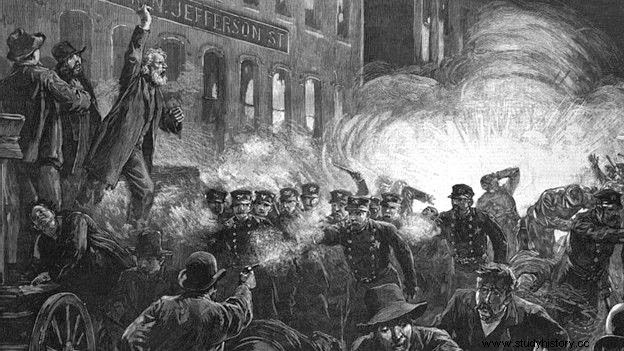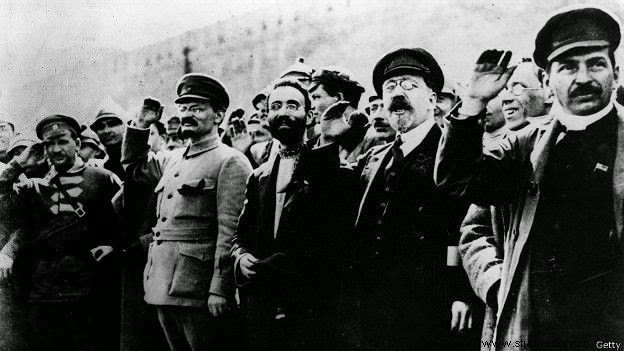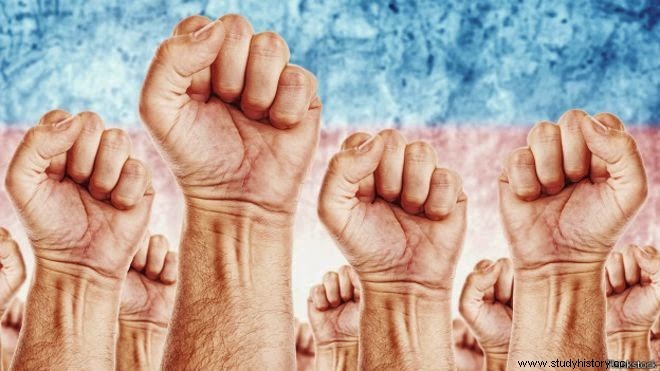THE FALL OF MODELS AND THE BERLIN WALL The Peruvian model of the Revolutionary Government of the Armed Forces lasted very little time, as well as the model that Tito wanted to implant in Europe. Peru ended up returning to the hands of the former owners of the capital and Yugoslavia was balkanized, later forming some five republics with dissimilar political orientations. In 1989 the Berlin wall fell and the world became unipolar with only the United States as the head of the planet. China mutated and with the ability that its leaders had inherited from Lao Tse, Confucius and Mao Tse Tung, it soon learned to live with Uncle Sam. North Korea and Cuba, like tiny moles on the skin of humanity, were the only countries that stoically supported the expansion of so-called neoliberalism, which is nothing other than neo-capitalism or "savage capitalism," as the Pope Paul II to this new stage of the socio-economic life of the world.

FROM THE INDUSTRIAL REVOLUTION TO THE AGE OF KNOWLEDGE Despite the ups and downs that humanity endured in the 20th century in its ideological-political conception, the world was advancing towards progress and industrial development ushered in the Age of Knowledge, with the essential support of high technology and information technology, where, as before, the fundamental axes of development are capital and work. Each one of these elements forms a substantial part of production and of the social relations of production, therefore, their ideas, customs and behaviors are embodied in the entire society, mainly in the economic and political dynamics.
IMPORTANCE OF CAPITAL AND LABOR AND THEIR HISTORICAL STRUGGLE Who could ignore the importance of capital, whether in capital goods or in "cold and cold" money for the development of a country? Likewise, who could argue with the importance of work? Nobody, be sensible. However, both factors of production have been in permanent conflict, undertaken by some to maintain the status quo and by others to achieve social justice. This struggle for power is what in the 20th century turned the world into a planet with four axes, two natural ones, the North and South poles, and two artificial ones, Uncle Sam and the Russian Bear, and the one that, now, has become a tripod of axes because the Russian Bear weakened with Perestroika and disappeared with Glasnot. Said historical conflict, between capitalists and workers, is the one that, due to not finding clear paths of development on either side, made the Peruvian ideologues and soldiers of the 1970s to walk down a non-capitalist and non-communist path, deludedly trying to take another alternate path, unprecedented and, in the end, unhappy. Capital and labor reached their fundamentalisms, their most angry and delusional moments. First, in the Persian Gulf War, when a coalition of thirty-four countries led by the United States attacked the Iraqis in Kuwait, primarily to defend the financial system, in the 1990s and 1991s. Second, in the 1980s and 1990s , when they wanted to make the "fifth sword" walk victoriously in Peruvian territory trying to take power from the "countryside to the city". The conflict with Iraq still has consequences and is being defined with the taking of that country by the United States. Instead, the traces of the “fifth sword” can only be seen in the VRAE.
IMPOSITION OF GREAT CAPITAL AND A CRY OF HOPE In the rest of the world, too, the socio-political struggle between capital and labor came to be elucidated in the guerrillas, the battlefields, and the military occupations, and whoever prevailed, after all, was capital. Work backed into its corner, there it is, bloodied, bruised and sore; but the worker, the peasant, the intellectual, the teacher, the housewife, all of them, men and women, worthy and honest workers, are not yet lifeless, surely they will resurface screaming as in one of the verses of Caesar's poem Vallejo:
“Long live with this b of the vulture in the entrails of Pedro and Rojas, of the hero and the martyr! Hail all the comrades soon! Long live the comrades at the foot of this spoon forever!
THE STRUGGLE HAS NOT BEEN IN VAIN The search for the historical space between capitalists and workers has not been in vain. Yesterday, the worker wanted to compensate himself with the flag of socialism and could not. Today, the capitalist indulges in the masquerade of neoliberalism. But, the last word has not been said because there are people and institutions that raise the flags of human dignity every day, mainly by dignifying the worker. One of them is the Catholic Church, which in almost half of the last century discussed this problem and determined to pronounce itself. Very few know this pronouncement and if they do they do not comment on it and if they do comment on it, they distort it..
A VERY ELOQUENT ANECDOTE An anecdote is enough to understand what was said. During the crisis in Peru, shortly after the seizure of power by the military in 1968, the President of the National Society of Industries, Mr. Reymundo Duharte, appeared on the program "Pulso" on Panamericana TV. The great journalist Alfonso Tealdo hosted this program. One of the guests was the journalist from "El Comercio" Mr. Augusto Zimmermann Zavala. Questions came and went and it was Zimmermann's turn to ask. - Could Mr. Duharte tell me if he agrees with the following quote:“The human work that is carried out in production and commerce is far superior to the other elements of economic life…?”.- I don't agree- said Ingº Duharte- because it is a Marxist thought…- No sir, it is a pronouncement of the Catholic Church, in Gaudium Et Spes…- Let's go to a court! –was the departure of Tealdo, skilled in these matters.
“IT IS A MARXIST THOUGHT”, THEY SAY… Everything that was not "heavenly music" for the ears of the capitalists and their representatives was branded as Marxist and because of that feeling, and with that pretext, they turn a deaf ear to the claims of social justice. listened to comment the thought of the Church on the work and the worker? Has any businessman who goes to mass every Sunday, prays on his knees, goes to confession frequently, etc., etc., has he applied the Church's thought in his company? Has any ideologue ever thought of commenting on this thought in a newspaper, magazine, book, radio or television? Has any union leader been heard arguing his demands based on the Church's thinking? Isn't it time that this thought prevails in this world, a slave to neoliberalism and savage capitalism?

READ, SPREAD AND APPLY! As a tribute to the Peruvian workers and the Magisterium of the Church, I publish some parts of the "Pastoral Constitution Gaudium Et Spes on the Church in the modern world", so that with Christian arguments they know how to enforce their rights and continue fighting for social justice. . I have given myself two licenses:the subtitles and the underlining of the most pertinent.
WHAT DOES THE CHURCH SAY ABOUT HUMAN WORK? “The human work that is carried out in production and in commerce or in services is far superior to the other elements of economic life, since the latter have no other role than that of instruments. Well, human work, autonomous or directed , proceeds immediately from the person, who marks with his imprint the matter on which he works and submits it to his will. It is for the worker and his family the ordinary means of subsistence; Through it, man joins his brothers and does them a service, can practice true charity and cooperate in the perfection of divine creation. Not only this. We know that, with the oblation of his work to God, men associate themselves with the redemptive work of Jesus Christ, who gave work an over-eminent dignity by working with his own hands in Nazareth. From this derives for every man the duty to work faithfully, as well as the right to work. And it is the duty of society, for its part, to help, according to its own circumstances, citizens so that they can find the opportunity of a sufficient job. Finally, the remuneration of work must be such that it allows the man and his family a dignified life in the material, social, cultural and spiritual plane, taking into account the job and the productivity of each one, as well as the conditions of the business and the common good. Economic activity is usually the result of the associated work of men; for this reason it is unjust and inhumane to organize and regulate it to the detriment of some workers. It is, however, too common today that workers are in a certain sense slaves of their own work. Which is in no way justified by the so-called economic laws. The whole of the production process must, therefore, adjust to the needs of the person and to the way of life of each one in particular, of their family life, mainly with regard to the mothers of families, always taking into account the sex and age. In addition, workers should be offered the opportunity to develop their qualities and personality in the workplace itself. By applying, with due responsibility, your time and strength to this work, let everyone enjoy a time of rest and rest sufficient to allow them to cultivate family, cultural, social and religious life. Moreover, they have the possibility to freely develop the energies and qualities that they may hardly be able to cultivate in their professional work.”
HOW SHOULD THE EMPLOYEE PARTICIPATE? “In economic enterprises, it is people who are associated, that is, free and autonomous men, created in the image of God. For this reason, taking into account the functions of each one, owners, administrators, technicians, workers, and preserving the necessary unity in management, the active participation of all in the management of the company must be promoted, according to forms that must be determined correctly. However, since in many cases it is not at the company level, but at higher institutional levels, where economic and social decisions are made on which the future of workers and their children depend, workers must also participate in such decisions. by themselves or through freely chosen representatives. Among the fundamental rights of the human person must be the right of workers to freely found associations that authentically represent the worker and can collaborate in the correct organization of economic life, as well as the right to freely participate in the activities of associations without risk of reprisals. Through this orderly participation, which is linked to progress in economic and social training, the sense of self-responsibility will grow more and more among all, which will lead them to feel collaborators, according to their own means and aptitudes, in the task economic and social development and the achievement of the universal common good”.

HOW SHOULD LABOR DISPUTES BE SOLVED? “In the event of economic-social conflicts, efforts must be made to find peaceful solutions. Although a sincere dialogue between the parties must always be resorted to first, however, in the present situation, the strike may continue to be a necessary, albeit extreme, means for the defense of the rights and the achievement of the just aspirations of the workers. . Find, however, as soon as possible, ways to negotiate and resume conciliatory dialogue.”
THE GOODS CREATED MUST BE EQUITABLE “God has destined the earth and all that it contains for the use of all men and peoples. Consequently, the goods created must reach everyone equitably under the aegis of justice and with the company of charity. Whatever the forms of property may be, adapted to the legitimate institutions of peoples according to diverse and variable circumstances, this universal destination of goods must never be lost sight of. Therefore, the man, when using them, must not have the external things that he legitimately possesses as exclusively his, but also as common, in the sense that they not only benefit him, but also others. For the rest, the right to possess a sufficient portion of property for themselves and their families is a right that corresponds to all. This is the feeling of the Fathers and the doctors of the Church, who taught that men are obliged to help the poor, and certainly not only with superfluous goods. Whoever is in a situation of extreme need has the right to take what is necessary for himself from the wealth of others. Having as there are so many currently oppressed by hunger in the world, the sacred Council urges everyone, individuals and authorities, to remember that phrase of the Fathers:Feed the one who dies of hunger, because, if you do not feed him, plants, according to their own possibilities, really communicate and offer their goods, helping in the first place the poor, both individuals and peoples, so that they can help themselves and develop by themselves”
THE PRIMARY PURPOSE OF THE INVESTMENT “Investments must be oriented towards ensuring job opportunities and sufficient benefits for the present and future population. Those responsible for investments and the organization of economic life, both individuals and groups or public authorities, must keep these goals in mind and recognize their serious obligation to monitor, on the one hand, in order to provide what is necessary for a decent life both for individuals and for the entire community, and, on the other hand, to foresee the future and establish a fair balance between the current needs of individual and collective consumption and the investment requirements for the future generation. Also, keep in mind the urgent needs of the economically less developed nations or regions. In terms of monetary policy, take care not to harm the good of your own nation or of others. Take precautions so that the economically weak are not unfairly affected by changes in the value of the currency.”
Lima, May 1, 2009 Julio R. Villanueva Sotomayo r
